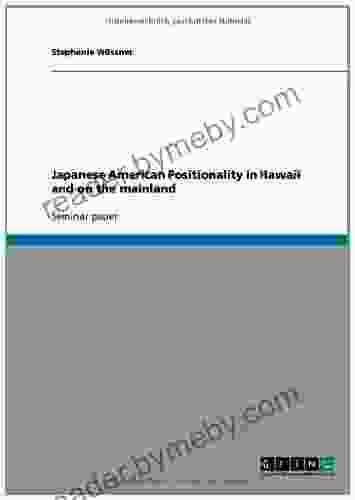Japanese American Positionality: A Tapestry of Identity and Experience

The history of Japanese Americans is a testament to human resilience, perseverance, and the ability to forge a sense of identity amidst adversity. From their arrival in Hawaii in the late 19th century to their forced internment during World War II and their subsequent struggles for recognition and equality, Japanese Americans have navigated a complex path that has shaped their unique positionality in American society.
4.9 out of 5
| Language | : | English |
| File size | : | 465 KB |
| Text-to-Speech | : | Enabled |
| Screen Reader | : | Supported |
| Enhanced typesetting | : | Enabled |
| Word Wise | : | Enabled |
| Print length | : | 42 pages |
This article aims to provide a comprehensive overview of Japanese American positionality in Hawaii and on the mainland, exploring the factors that have influenced their identities, the challenges they have faced, and their contributions to the nation.
Immigration and the Shaping of Identity
The first Japanese immigrants arrived in Hawaii in 1885, drawn by the promise of work on sugar plantations. In the decades that followed, hundreds of thousands of Japanese immigrated to Hawaii and the mainland, bringing with them their own cultural traditions and values.
As they settled into their new homes, Japanese Americans faced a variety of challenges, including discrimination, racism, and economic hardship. However, they also found ways to preserve their heritage and create a sense of community. They established Japanese language schools, churches, and other institutions that helped them maintain their cultural ties.
The experience of immigration had a profound impact on Japanese American identity. While they embraced American values and ideals, they also retained a strong sense of their Japanese heritage. This dual identity became a defining characteristic of Japanese Americans.
World War II and the Internment
The entry of the United States into World War II had a devastating impact on Japanese Americans. In the aftermath of the attack on Pearl Harbor, over 110,000 Japanese Americans, including citizens and immigrants, were forcibly removed from their homes and placed in internment camps.
The internment experience was a traumatic one for Japanese Americans. They were subjected to harsh conditions, denied their civil liberties, and separated from their families and communities. Despite these hardships, many Japanese Americans remained loyal to the United States, serving in the military and contributing to the war effort.
The internment had a lasting impact on Japanese American identity. It reinforced their sense of alienation and isolation from American society. However, it also sparked a movement for redress and recognition that would eventually lead to an apology from the U.S. government and the establishment of reparations.
Post-War Assimilation and Activism
After the war, Japanese Americans faced a new set of challenges. They were eager to assimilate into American society, but they also wanted to preserve their cultural heritage. They struggled to find a balance between these two goals.
In the 1960s and 1970s, a new generation of Japanese Americans emerged, inspired by the civil rights movement. They challenged the status quo, demanding equality and recognition for their community. They organized protests, established community centers, and worked to improve education and economic opportunities for Japanese Americans.
This activism had a significant impact on the positionality of Japanese Americans. It helped to raise awareness of their history and culture and contributed to a greater understanding and acceptance of Japanese Americans in American society.
Contributions to American Society
Throughout their history, Japanese Americans have made significant contributions to American society. They have served in the military, excelled in business and the arts, and made important contributions to science, technology, and other fields.
Japanese Americans have also played a vital role in promoting cultural understanding between the United States and Japan. They have served as bridges between the two countries, sharing their knowledge and perspectives.
The contributions of Japanese Americans have enriched American society and helped to shape its diverse and inclusive character.
The positionality of Japanese Americans in Hawaii and on the mainland is a complex and multifaceted one. They have navigated a path of immigration, discrimination, internment, and activism, forging a unique identity that blends American values with Japanese heritage.
Through their perseverance, resilience, and contributions to society, Japanese Americans have earned a place of respect and admiration in American history. Their story is a reminder of the power of the human spirit to overcome adversity and create a better future.
4.9 out of 5
| Language | : | English |
| File size | : | 465 KB |
| Text-to-Speech | : | Enabled |
| Screen Reader | : | Supported |
| Enhanced typesetting | : | Enabled |
| Word Wise | : | Enabled |
| Print length | : | 42 pages |
Do you want to contribute by writing guest posts on this blog?
Please contact us and send us a resume of previous articles that you have written.
 Book
Book Novel
Novel Page
Page Chapter
Chapter Text
Text Story
Story Genre
Genre Reader
Reader Library
Library Paperback
Paperback E-book
E-book Magazine
Magazine Newspaper
Newspaper Paragraph
Paragraph Sentence
Sentence Bookmark
Bookmark Shelf
Shelf Glossary
Glossary Bibliography
Bibliography Foreword
Foreword Preface
Preface Synopsis
Synopsis Annotation
Annotation Footnote
Footnote Manuscript
Manuscript Scroll
Scroll Codex
Codex Tome
Tome Bestseller
Bestseller Classics
Classics Library card
Library card Narrative
Narrative Biography
Biography Autobiography
Autobiography Memoir
Memoir Reference
Reference Encyclopedia
Encyclopedia Michael M Kaiser
Michael M Kaiser Stephanie Cooke
Stephanie Cooke Margaret Levi
Margaret Levi Peter B Cotton
Peter B Cotton Staci Swider
Staci Swider Mike Sielski
Mike Sielski Loree Griffin Burns
Loree Griffin Burns Taniela Tabu
Taniela Tabu Rod Weston
Rod Weston Sophie Kinsella
Sophie Kinsella Malina Malkani Ms Rdn Cdn
Malina Malkani Ms Rdn Cdn Masato Takeda
Masato Takeda Stephen Chan
Stephen Chan Veronica R Lynch
Veronica R Lynch Larry K Brendtro
Larry K Brendtro Victor Godinez
Victor Godinez S G Taylor
S G Taylor William Kennedy
William Kennedy Thaylane R Ramos
Thaylane R Ramos Nicholas Booth
Nicholas Booth
Light bulbAdvertise smarter! Our strategic ad space ensures maximum exposure. Reserve your spot today!

 Denzel HayesPractice Questions For The Nurse Diabetes Educator Exam CDE Exam: Your Key to...
Denzel HayesPractice Questions For The Nurse Diabetes Educator Exam CDE Exam: Your Key to... Ruben CoxFollow ·14k
Ruben CoxFollow ·14k Vic ParkerFollow ·12.2k
Vic ParkerFollow ·12.2k Evan HayesFollow ·18.9k
Evan HayesFollow ·18.9k Forrest BlairFollow ·14.4k
Forrest BlairFollow ·14.4k Jarrett BlairFollow ·3.5k
Jarrett BlairFollow ·3.5k Deion SimmonsFollow ·5.8k
Deion SimmonsFollow ·5.8k Houston PowellFollow ·4k
Houston PowellFollow ·4k Louis HayesFollow ·10.4k
Louis HayesFollow ·10.4k

 Wayne Carter
Wayne CarterThe Beginner's Guide to Making an Old Motor Run Forever
If you're like most...

 Deacon Bell
Deacon BellNepali Adventure: Kings and Elephant Drivers,...
In the heart of the...

 Carlos Drummond
Carlos DrummondThe Romantic Revolution: A Journey Through History and...
Unveiling the...

 Kazuo Ishiguro
Kazuo IshiguroUnlock Your Inner Innovator: Dive into the New Wave...
Embark on a Transformative Journey of...

 William Golding
William GoldingCrazy Horse: The Lakota Warrior's Life and Legacy
In the annals of Native...

 Hector Blair
Hector BlairMildred and Richard Loving: The Inspiring Story of...
Mildred and Richard Loving were an...
4.9 out of 5
| Language | : | English |
| File size | : | 465 KB |
| Text-to-Speech | : | Enabled |
| Screen Reader | : | Supported |
| Enhanced typesetting | : | Enabled |
| Word Wise | : | Enabled |
| Print length | : | 42 pages |










